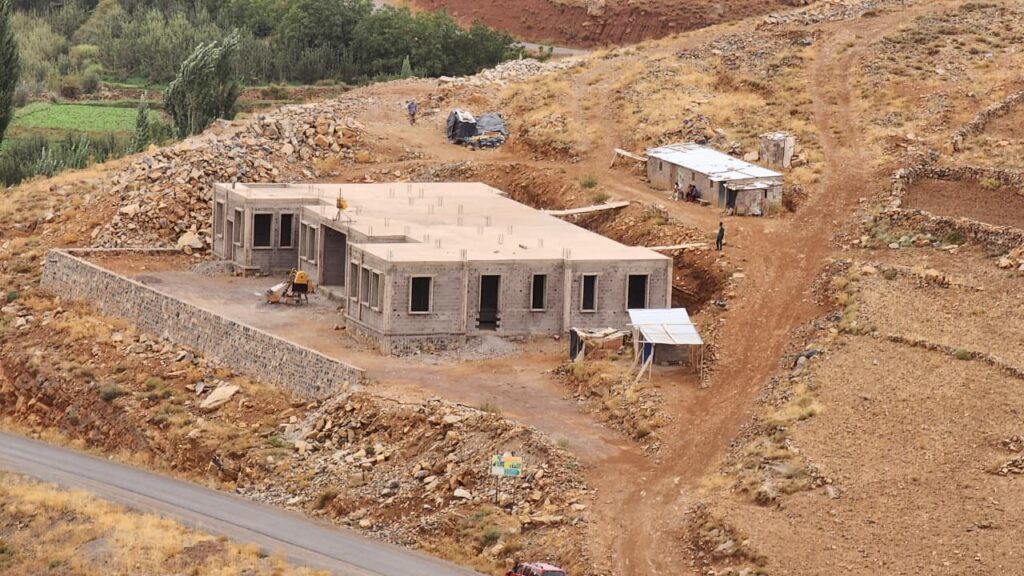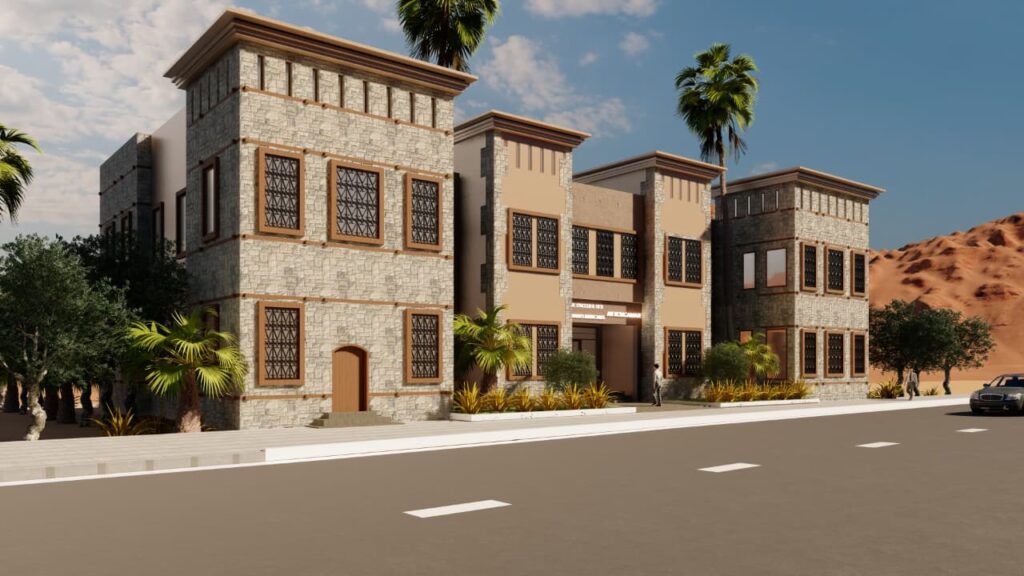
1. Project Introduction
The Medical Caravans Center is an ambitious community-driven initiative located in Ifrane village, at the heart of Aït Bouguemez Valley, Azilal Province, Morocco. This valley, surrounded by the majestic High Atlas Mountains, is one of the most picturesque yet underserved regions of Morocco. Its beauty and cultural richness contrast sharply with the lack of essential public services—especially healthcare.
For decades, the inhabitants of Aït Bouguemez have faced significant barriers in accessing medical care. Illnesses that are easily treatable in cities often turn into life-threatening conditions here due to delayed access to doctors, lack of medical equipment, and long travel times.
The Medical Caravans Center is conceived as a permanent solution to this chronic healthcare gap. Rather than relying only on occasional visits from NGOs or temporary clinics, the center will serve as a dedicated hub for medical caravans, ensuring continuity, sustainability, and efficiency in healthcare delivery.
Project Vision
To transform Aït Bouguemez into a valley where basic healthcare is accessible to every resident, regardless of geography, climate, or financial status.
Project Mission
To establish a fully functional, well-equipped, and permanent center that hosts medical caravans, supports healthcare professionals, and provides preventive and curative health services for thousands of residents.
Core Values
- Equity: Health is a fundamental right for every person.
- Solidarity: Building bridges between rural communities and national/international humanitarian actors.
- Sustainability: Creating a long-term solution instead of temporary relief.
- Community Engagement: Empowering locals to be active participants in their health journey.
Current Status
The center is already under construction. Foundations and the ground floor have been completed. This achievement reflects the determination of the local community and their partners, particularly AMDAME Association (France), which has provided financial support and expertise. However, the project remains incomplete and urgently requires additional resources to move forward.
2. The Urgent Need for the Center
Geographic and Healthcare Context
Aït Bouguemez Valley is located in the central High Atlas, more than 2,000 meters above sea level. It is home to dozens of scattered villages (douars) with an estimated population of 15,000–20,000 people.
The nearest regional hospital is in Azilal city, more than 70 km away. While this distance may not seem insurmountable in urban areas, in the context of mountainous Morocco, it represents an enormous challenge:
- The road is narrow, winding, and often blocked by snow in winter.
- Many families do not own vehicles, and public transportation is rare and expensive.
- Emergency cases such as complicated childbirths or accidents cannot withstand such delays.
As a result:
- Maternal mortality rates are higher due to lack of access to skilled birth attendants.
- Child mortality is aggravated by untreated infections and delayed vaccinations.
- Chronic diseases like diabetes and hypertension go undiagnosed and untreated, leading to avoidable complications.
The Problem with Current Medical Caravans
Medical caravans organized by NGOs and associations do occasionally reach Aït Bouguemez. While these missions provide valuable temporary relief, they suffer from key limitations:
- Lack of proper infrastructure means doctors must work in schools, tents, or borrowed spaces.
- This restricts the type of medical procedures they can perform.
- No secure accommodation is available for medical staff, reducing the duration and frequency of missions.
- No proper record-keeping system exists, making patient follow-up impossible.
Why a Permanent Center is Needed
The Medical Caravans Center directly addresses these issues by:
- Offering a permanent and safe facility for medical caravans.
- Providing accommodation, sanitation, and logistical support for medical teams.
- Allowing continuity of care through patient files and follow-up.
- Encouraging NGOs and volunteer doctors to return regularly, knowing they have the infrastructure needed to be effective.
3. Achievements So Far
Despite limited means, the project has already accomplished significant milestones:
- Construction progress: Foundations and ground floor completed, representing about 35% of the total building.
- Community mobilization: Local villagers contributed labor, materials, and logistics, showing their ownership of the project.
- Financial investment: To date, approximately 1000000 DH has been invested, covering basic construction costs.
- Partnerships: AMDAME Association (France) has played a pivotal role, both financially and in validating the project to international partners.
- Credibility established: The progress demonstrates that the project is not just a concept, but a reality in motion.
4. Remaining Work
Construction Needs
- Completion of the upper floor.
- Internal finishing: plastering, painting, flooring, doors, and windows.
- Roofing and insulation (essential for extreme winters).
- External works: access paths, drainage, and landscaping.
Equipment Needs
- Medical equipment: Examination tables, diagnostic kits, minor surgical tools, sterilization equipment, oxygen concentrators.
- Pharmaceutical storage: Secure room with shelves and refrigeration for medicines and vaccines.
- Furniture: Beds, chairs, desks, storage cabinets, waiting area benches.
- Accommodation facilities: Dormitories for doctors, kitchen, sanitary blocks.
Utility Needs
- Connection to the electric grid or installation of a solar system for sustainable energy.
- Water supply and sanitation facilities.
- Heating and insulation to withstand freezing temperatures.
Financial Estimate
To complete construction and provide the minimum equipment and furniture, an additional 300,000 Moroccan Dirhams (~€27,000) is required.
5. Social and Humanitarian Impact
The Medical Caravans Center is not just a building—it is a lifeline for thousands of people.
Expected Outcomes
- Healthcare Access
- Medical caravans will operate on a regular schedule, not just occasionally.
- Residents will have continuous access to consultations and treatments.
- Reduced Mortality and Suffering
- Children will benefit from timely vaccinations and early treatment of infections.
- Women will have safer pregnancies and deliveries with access to skilled professionals.
- Elderly patients with chronic diseases will receive consistent monitoring.
- Preventive Healthcare
- Health awareness campaigns on hygiene, nutrition, and chronic diseases.
- Training villagers in first aid and preventive practices.
- Community Empowerment
- Locals will participate in running and maintaining the center.
- The project will instill a sense of pride and ownership among residents.
Broader Impact
- Equity: Narrowing the rural-urban healthcare gap.
- Trust: Restoring confidence in healthcare among marginalized populations.
- Stability: Healthier communities are more resilient socially and economically.
6. Call for Contributions
We extend a heartfelt invitation for support to:
- Philanthropists and individual donors: Every donation directly changes lives.
- National and international NGOs: Partner with us to make your missions more effective and sustainable.
- Public and private institutions: Demonstrate social responsibility by investing in healthcare equity.
Forms of Contribution
- Financial donations to cover construction and equipment.
- In-kind donations (construction materials, medical equipment, furniture).
- Technical expertise from doctors, engineers, or logisticians.
Transparency Commitment
- Detailed financial reporting will be shared with donors.
- Regular updates (photos, videos, reports) will document progress.
- Donors will be acknowledged in all communications and at the center itself.
7. Future Perspectives
The center is not the end goal but the beginning of a sustainable healthcare model for mountain communities.
Medium-Term Plans
- Establish a small emergency unit for urgent cases.
- Create a training hall for villagers on health, hygiene, and first aid.
- Launch mobile health units operating from the center to reach the most remote villages.
Long-Term Vision
- Transform the center into a regional hub for rural healthcare innovation.
- Attract long-term partnerships with universities, hospitals, and research institutions.
- Develop programs on telemedicine, allowing specialists from cities to consult patients remotely.
- Incorporate renewable energy solutions to make the center self-sufficient and environmentally responsible.
Conclusion
The Medical Caravans Center in Ifrane, Aït Bouguemez is more than a building project. It represents:
- Hope for thousands of people who have suffered too long without healthcare.
- Solidarity between rural Morocco and national/international partners.
- Change—a tangible step towards equity and dignity.
By contributing to this project, donors will not only provide immediate relief but also lay the foundation for a sustainable, just, and humane healthcare model in the High Atlas Mountains.
Together, we can ensure that no child, no woman, no elder in Aït Bouguemez is denied healthcare simply because of where they live.


